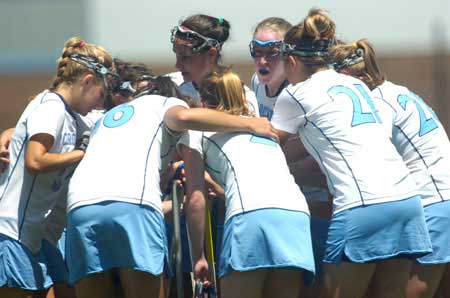What is a Champion?
What are the daily habits of a Champion?
Can anyone be a Champion and if so, how?
FROM MY EXPERIENCE working over the last 40 years with thousands of team and individual national and world-class champions, I can assure you that being a champion is NOT as far fetched as you might imagine. Read the following and see how reaching such a level is within your grasp. Let me help you to begin today to live your life as a champion.
THE FOLLOWING IS AN EXCERPT FROM MY BOOK TITLED: "THE WAY OF THE CHAMPION"
So you would like to become a champion. Following the advice of actor Robert De Niro. . . "fuhgeddaboutit". It's not possible; it doesn't happen. Having said that, I know I now have your attention. You see, a champion is never something you become. . . ever. It starts now by acting as a champion, committing yourself to practicing the habits and ways of a champion, choosing to engage in a lifestyle that demonstrates such qualities and characteristics on a consistent, daily basis. This "way of being" is, in the words of scholar Joseph Campbell, a hero's journey, an up and down, gain and loss odyssey of self-discovery as you become dedicated to exploring the unlimited boundaries of your full human potential in athletics and life. Along this journey the true champion must ask: does this journey have heart, passion and love? If not, misery and failure will result. If so, success will be the by-product.
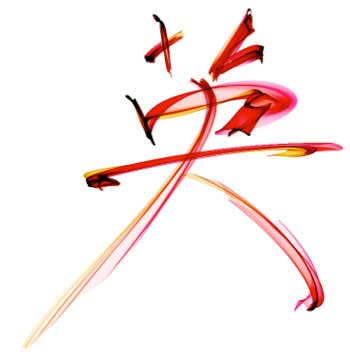 Champions are valiant fighters and brave warriors. In ancient times, warriors were courageous, focused, visionary, modest, passionate and completely selfless, working for the higher good of the group or tribe. They were "athletes" of indomitable spirit and iron will who, by believing in themselves, knew that all was possible. These Zen warriors were specialists in defeating an opponent where the true battle had less to do with external events than it did with the battles raging inside themselves. They were fierce competitors who waged war against their inner fears, frustration, fatigue and self-doubt, and the rewards for such victory were deeply personal and satisfying. Winning was always the by-product of their victories within.
Champions are valiant fighters and brave warriors. In ancient times, warriors were courageous, focused, visionary, modest, passionate and completely selfless, working for the higher good of the group or tribe. They were "athletes" of indomitable spirit and iron will who, by believing in themselves, knew that all was possible. These Zen warriors were specialists in defeating an opponent where the true battle had less to do with external events than it did with the battles raging inside themselves. They were fierce competitors who waged war against their inner fears, frustration, fatigue and self-doubt, and the rewards for such victory were deeply personal and satisfying. Winning was always the by-product of their victories within.
Although in athletics certain physical strengths are needed to excel, there are additional "ways" and qualities that separate the champions from the near champions, a host of internal, intangible characteristics that I refer to as the "stuff of champions". One such person who exemplifies these traits is distance runner Keith Foreman, who was told by a prominent, world -renowned college coach that he didn't have the "right stuff" to compete at that level, that he essentially didn't measure up. With champion-like qualities of courage, fortitude, determination, tenacity and perseverance, Keith went on to become an all-American and only the fifth US runner to break the four-minute mile barrier. In my mind, Keith possessed the way of the champion. . . his heart and soul were into it. Keith truly was the quintessential warrior.
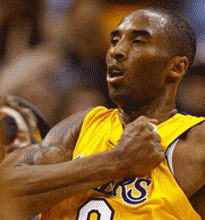
Similar to Keith's experience, brilliant scientists have stated that the American bumblebee cannot fly. They determined through their research that it has none of the "right stuff" for flight to occur, yet, for some reason, it seems to be a champion aviator. Like this creature, we all have within us untapped strengths and powers that, once accessed and coupled with proper training and coaching, can enable us to "fly" in our arena of choice.
Yet another example is the legendary racehorse, Seabiscuit, considered by the so-called experts to not have star capability. He lacked all of traditional earmarks of the truly great horses yet he ran with heart and became a successful champion. As an interesting side note, it is understood in the racehorse culture that only champion horses receive a formal burial ceremony when they die. They bury the heart and head while discarding the body because those intimately associated with the animal know that it became a champion by demonstrating courage (from the French word Coeur, meaning heart), tenacity, fearlessness and the willingness to suffer pain, all qualities of a true warrior.
Following a close victory against the University of Notre Dame for their 15th NCAA soccer championship, Anson Dorrance, head coach of the University of North Carolina Tarheels said: "You win these games with heart, and we spend four years working that muscle." Singer songwriter Michael Bolton reminds us of this: "to look beyond the glory is the hardest part, for a champion's strength is measured by heart."
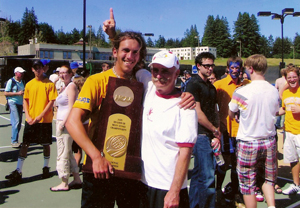
And let's remember that participating in athletics is not a pre-requisite for entering into the champion's domain. In fact, most who adhere to the lifestyle of a champion choose other arenas of performance to demonstrate these qualities. For example, my wife Jan is a true champion in all aspects of her life. I can never forget her dedication, sacrifice, courage, patience, persistence, perseverance, tenacity, fortitude, bravery and determination during the birthing process of our children.
And I thought the grueling pain I experienced during an all out race such as a marathon was remarkable until I witnessed her courageous efforts during child delivery. Her preparation and training for those events were not unlike the focus of all great champions. Her champion-like core continues to carry over to her work as a physician, a runner and a mother of four vibrant, challenging, active children. Like all champions, she strives to gain positive results, yet savors the process. Her life exemplifies what I call "The Way of the Champion."
This way of champions in athletics and other arenas of life demands high self-esteem, self-awareness, integrity and the ability to take the risks to improve while using failure as a teacher on the road to self-discovery. Where the average athlete and achiever are aware of everything when they think they should be, the champion is aware of all things at all times. Champions focus on consistent preparation and performance and know that all outcomes and results are natural by-products of strong commitments to a thorough, intense work ethic. In the words of philosopher Aristotle, "we are what we consistently commit to doing". Champions believe in themselves and display a strong desire to do whatever it takes to get it done. They fail, yet unlike the non-champion, tolerate such setbacks as natural, inevitable results of entering the competitive arena in sports and all walks of life. They are tenacious, fearless, audacious, proud and confident in their ability to be this way, win or lose. Of course, they want to win on the scoreboard or get that contract in business, and will do all that is necessary to gain that victory. Yet, they know that such a win or outcome is never certain and if it comes it is usually the result of their inner victories. Champions distinguish themselves from all others in that they are willing to sacrifice, suffer and do all those things that the non-champions will not do.
Champions see sports and life as a forum where they can use their opponents as partners. The word "competitor" is taken from a Latin root meaning to "seek together". When a "worthy opponent", in the heat of a competitive situation or event, goes all out, you learn to dig deep and discover reserves you never knew existed. Your opponent gives you the distinct opportunity, in a condensed period of time, to gain personal wisdom about winning and understanding what you are made of in order to live like a champion in the games of athletics and life. Know that how you meet challenges in sports determines how you approach obstacles in your personal life.
Champions fully grasp the difference between what they can and can't control in an event or life situation and choose to focus on the former. Outcomes and results cannot be controlled; because of this, one becomes tight, tentative, tense, anxious and stressed. Preparation, attitude, emotions, work-rate, effort and doing the "little things" are some elements of competition you can control and these help you to relax, stay calm and focus with intent. (see Chapter 9: Little is Large.) Knowing you can control these aspects of your game builds confidence and as we know, a confident, calm attitude helps you to perform consistently at higher levels. It's important to realize, though, that even if you control all these aspects of performance, there is no guarantee that the outcome or results will be in your favor; it will, however, enable you to be at your best and feel great satisfaction in the process. Winning, therefore, for the champion, is defined as the ability to demonstrate your best on a more consistent basis by being victorious over those inner demons previously mentioned. Winning, for the champion, becomes a multidimensional experience of winning within, demonstrating personal greatness and hopefully, resulting in favorable outcomes as well.
Thinking about winning in this way takes practice. You do it by using subtle shifts of the heart and mind. This book, The Way of the Champion: Sacred Lessons for Mental Strength, Leadership and Winning in Athletics and Life, will train you to become skillful in this regard. To help with these shifts, I use the 2000-year-old Chinese classic The Art of War by the strategist SUN-TZU as well as wisdom from other ancient Taoist books such as the I Ching and the Tao Te Ching. These books offer principles for mental strength, conscious leadership and strategic winning for a more fulfilling, satisfying experiences in the traditional notion of external victory. Such principals, especially for winning, have been used by martial artists, great warriors, coaches, generals and successful corporate CEO's worldwide. These are universal ways, or the way things naturally work. . . a TAO. . . using strategy, tactical positioning, competitive advantage and self-awareness based on the laws of nature. I have successfully applied SUN-TZU's and other Tao wisdom throughout my career with athletes and people in any field of endeavor. What most begin to realize when using this TAO or paradigm shift is how clear and natural the opportunity for inner growth and self-improvement becomes while discovering personal and collective greatness. Here is a way to navigate the journey of infinite potential. The true champion has all of the foregoing virtues as well as what I call the "Winner's Heart."
It is important that I point out how there are many champions who are recognized for their tremendous victories in high pressure arenas of competition in athletics and professional circles, yet do not acknowledge The Way of the Champion, philosophically. And by the same token, there are many who live the way outlined within this book yet have never officially been outwardly recognized as champions. The difference between the two seems to be that by living The Way of the Champion, you are somewhat assured that you will discover how great you can be... to reach extraordinary levels of personal best performance. And, in the process of such performance, you increase the likelihood of being on the podium as well. This "way" is a choice and you have the power to choose to be a champion or to be ordinary.
I know about this "way" because I have worked with thousands of national and world-class warrior champions in the NBA, NFL, PGA and Olympics as well as CEO's in business and others in all arenas of life. During the last 15 years, I have published eight books on the Tao and performance, while working with some of the greatest collegiate athletes and teams at Duke, Stanford, Maryland, Missouri, Colorado, Iowa, Ohio State, Columbia, California and many others. In the last fifteen years I have worked with 36 teams who have gone to a "Final Four" with 16 winning national championships. I have learned more from this experience than I have taught.
As a coach, a national-class athlete, sports psychologist, teacher, author and father of several athletic children, the "way of the champion" is present in my life everywhere. In addition to this, I have experienced personal winning in numerous competitive arenas of sports to include baseball, basketball, track, cross-country, cycling, distance running, tennis, and racquetball.
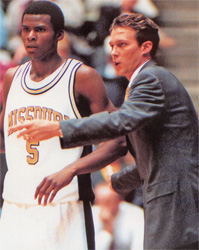 If you wish to take your "game" to the next level, what I have learned will help you to discover the greatness that lies within you. What I know is that the making of a champion is all about heart. While the champion sees the game or a battlefield against an opponent or clock, it's also an arena for the battle within against such demons as fear, fatigue, frustration, failure and self-doubt. These inner battles are fought with weapons of the heart or what I like to call "the stuff of champions", the right stuff. In this sense, being a champion is a spiritual practice of embracing and connecting to the "right stuff", sacred virtues such as courage, fortitude, compassion, commitment, patience, perseverance, passion, integrity, responsibility, respect, relationship, selflessness, suffering and surrender. By learning and applying the right stuff, and absorbing the lessons of champions and the wisdom of Tao, you will live your life with the substance and spirit of a champion and be a true winner in every aspect of the game of life.
If you wish to take your "game" to the next level, what I have learned will help you to discover the greatness that lies within you. What I know is that the making of a champion is all about heart. While the champion sees the game or a battlefield against an opponent or clock, it's also an arena for the battle within against such demons as fear, fatigue, frustration, failure and self-doubt. These inner battles are fought with weapons of the heart or what I like to call "the stuff of champions", the right stuff. In this sense, being a champion is a spiritual practice of embracing and connecting to the "right stuff", sacred virtues such as courage, fortitude, compassion, commitment, patience, perseverance, passion, integrity, responsibility, respect, relationship, selflessness, suffering and surrender. By learning and applying the right stuff, and absorbing the lessons of champions and the wisdom of Tao, you will live your life with the substance and spirit of a champion and be a true winner in every aspect of the game of life.
Presented in this book, The Way of the Champion, are clear, concise, natural and practical time-honored sacred lessons on how to act like a champion. I integrate, where appropriate, the wisdom of ancient Chinese books such as the Tao Te Ching, the I Ching, and The Art of War as it applies to the essential aspects of the champion. For example, the personal battle or conflict one could feel completing an enormous work project, preparing a meal for twenty-five people or finishing a 26-mile race can seem overwhelming. I have had the feeling at mile twenty of a marathon... "I can't go on; it hurts too much"... it is so intense for many runners that the thought of going six more miles seems problematic at best. However by going only one mile at a time and replicating it six more times, one learns the ancient lesson: when you divide a seemingly insurmountable task into small manageable segments you achieve a goal. How do you swallow an elephant?. . . one bite at a time. This TAO lesson, once grasped, is easily applied to all of life's struggles and can enable you to accomplish extraordinary things in any field of endeavor. These TAO lessons, through sports, will help you to witness so much of life in small dramatic ways. Andrew Cooper's book "Playing in the Zone" tells us how "sport is a container where passions are channeled and virtues cultivated". Sport is a spiritual event that can enrich your soul, awakening in all of us a higher sense of self, the true winner within.
This book is a deeply spiritual, unique, creative, inner approach to mental strength, leadership and winning that will help to "marinate" your mind and heart in a serene, tranquil and heightened state of self-confidence. Emphasized is a process of thought as well as trust in your intuitive self, what basically makes sense according to the Zen precept of "doing the right thing". You will learn how to reach personal and team best performances by clearing barriers and neutralizing the impact of obstacles standing in the way of success, whether these obstacles are self related, environmentally induced or brought on by other athletes, teams or personal relationships affecting you in everyday life. According to SUN-TZU, best performances are achieved as much in knowing what not to do and when not to do it.

